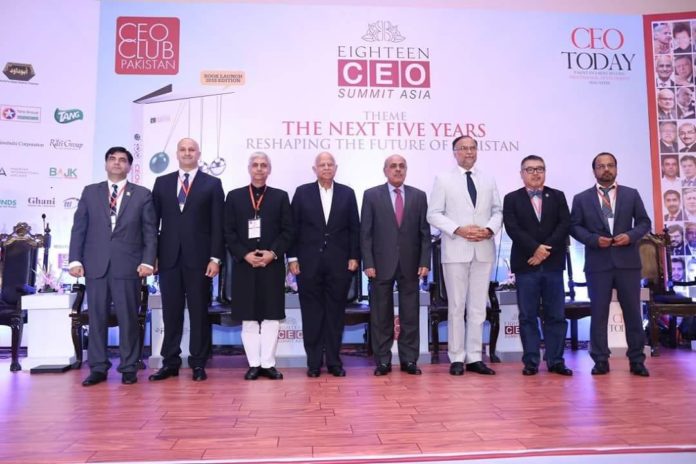The book ‘100 Best Performing CEOs & Companies of Pakistan 2018’ was also launched at the conference; leading executives spoke on ‘The Next Five Years: Reshaping the Future of Pakistan’
Lahore (Muhammad Yasir) CEO Club Pakistan and Management House successfully organized the ‘EIGHTEEN CEO Summit Asia 2018’, Pakistan’s most anticipated event for the Business Community. The conference also saw the launch of the seventh international edition of the best- selling book ‘100 performing CEOs & Companies of Pakistan 2018’, which embraces hundred success stories of Pakistani CEOs working on national or international level, surmounting all the difficulties and casting a softer image of Pakistan on the global spectrum.
Mr. Tarek Hamdy – CEO, EIGHTEEN (Elite Estates Private Limited), Ijaz Nisar, Founder & President CEO Club Pakistan & Management House, Kimihide Ando – SVP & GM, Mitsubishi Corporation Pakistan (Sitara-i-Pakistan), Ikram ul Majeed Sehgal – Chairman, Pathfinder Group, Ahsan Iqbal – Former Federal Interior Minister, and Saquib Ahmad – Country Director Pakistan, SAP Middle East & North Africa LLC amongst a host of other distinguished professionals spoke on the conference’s theme – ‘‘The Next Five Years: Reshaping the Future of Pakistan’.
Mr. Tarek Hamdy – CEO, EIGHTEEN (Elite Estates Private Limited) shared his view, stating that there was an urgent need to address the energy and water crisis at policy level. Moreover, perspicacious and intellectual business mentors and leaders enlightened the audience with their experience and savoir faire.
Pakistan’s GDP growth rate has been impressive for the past couple of years, which should be sustained its upward trajectory with the facilitation of the government to private sector and the participation of the business leaders in terms of their role and thought leadership, he added.
Malik Muhammad Rafique Rajwana – Governor Punjab said the progress of the country depends upon the role of its people in the economic activities; hence the performance of business leaders is crucial in the development and prosperity of the country.
Public listed companies and private corporation should not only expand their business countrywide to meet the growing demand of the public for their products and services but these entities should also promote made-in-Pakistan tag in the world through broadening their targeted market per se in different countries, he added.
Following the conference, the latest edition of the ‘100 performing CEOs & Companies of Pakistan 2018’ was distributed to more than 500 CEOs, cusiness leaders, political stalwarts and foreign delegates who attended this year’s event.
The magnum event of the business world also streamed online to more than hundred countries and reached the world through social media. CEO Club Pakistan and Management House continuously strive hard to bring stature and prestige to Pakistani business community on a global level, while also allowing for a networking platform. It has also contributed its due share in the mushrooming book culture prevalent in the country today.
Next Five Years Talking Points:
1. A pragmatic foreign policy based on our relationship with neighbors to be determined by economic and bilateral interests rather than politics alone.
2. Address Chinese perceptions of CPEC. The Chinese have voiced concerns regarding negative CPEC talk, security and red tape.
3. Tariffs, trade and taxation. Policies over the last two decades have not resulted in material improvements to Pakistan’s competitiveness. This is a critical matter.
4. CPEC is a golden opportunity to improve our institutions of governance and provide vital infrastructure, energy and telecom connectivity with the world.
5. Resolution of water conditions before it becomes an overwhelming issue.
6. Cohesive policy imperatives:
1. Energy
2. Industrial policy
3. Trade policy
4. Foreign exchange regime
5. Financial policy
6. Skill development policy
7. Pakistani expatriates deep engagement






